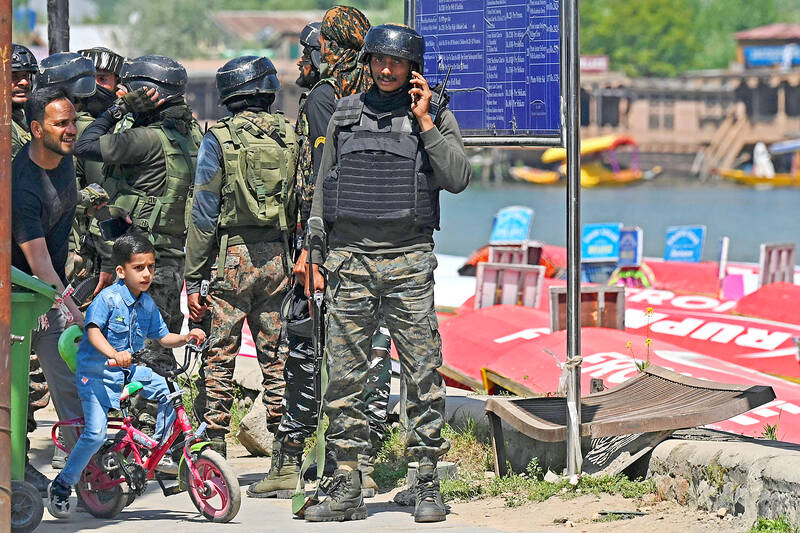A G20 tourism meeting was set to begin yesterday amid high security in Indian-administered Kashmir, with China and Pakistan condemning holding the event in the disputed territory.
Muslim-majority Kashmir has been disputed between New Delhi and Islamabad, both of which claim it in full, since their independence 75 years ago.
The Indian-controlled portion has been roiled for decades by an insurgency seeking independence or a merger with Pakistan, with tens of thousands of civilians, soldiers and Kashmiri rebels killed in the conflict.

Photo: AFP
Police last week said that security had been beefed up “to avoid any chance of terrorist attack during the G20” meeting, the first diplomatic event in the territory since New Delhi revoked its limited autonomy and took direct control in 2019.
The three-day gathering is at a sprawling, well-guarded venue on the shores of Dal Lake in Srinagar.
Roads leading to the location have been freshly black-topped, and electricity poles lit up in the colors of India’s national flag to show what officials say is “normalcy and peace returning” to the region.
India has been promoting tourism in Kashmir and more than a million of its citizens visited last year.
No Chinese delegates are to attend.
India and its northern neighbor are locked in a military standoff along their mostly undemarcated border in the Ladakh region.
Beijing also claims the Indian state of Arunachal Pradesh in full as part of Tibet, and it considers Kashmir a disputed territory.
“China firmly opposes holding any form of G20 meeting in disputed territory and will not attend such meetings,” Chinese Ministry of Foreign Affairs spokesman Wang Wenbin (汪文斌) told reporters on Friday.
Turkey, Saudi Arabia and Indonesia are reportedly also unlikely to join.
India holds the G20 presidency this year and has planned more than 100 meetings across the country.
China has already stayed away from events in Ladakh and Arunachal Pradesh.
Non-G20 member Pakistan controls a smaller part of Kashmir and said that holding the tourism meeting in the territory contravened international law, UN Security Council resolutions and bilateral agreements.
Pakistani Minister of Foreign Affairs Bilawal Bhutto Zardari last week said that India was displaying its “arrogance to the world” and that “it shows their pettiness,” triggering a sharp retort from New Delhi.
India says that Pakistan has trained and supported militants in Kashmir, which Islamabad denies.
Since India’s 2019 constitutional changes, rebels in Kashmir have largely been crushed — although young men continue to join the insurgency.
However, dissent has been criminalized, media freedoms curbed and public protests limited, in what critics say is a drastic curtailment of civil liberties by India.
Last week, UN Special Rapporteur on Minority Issues Fernand de Varennes said that New Delhi was seeking to use the G20 meeting to “portray an international seal of approval” on a situation that “should be decried and condemned.”
India rejected those comments.
Residents have chafed under the stepped-up security measures, hundreds have been detained in police stations and thousands including shopkeepers have received calls from officials warning them against any “signs of protest or trouble.”

Kehinde Sanni spends his days smoothing out dents and repainting scratched bumpers in a modest autobody shop in Lagos. He has never left Nigeria, yet he speaks glowingly of Burkina Faso military leader Ibrahim Traore. “Nigeria needs someone like Ibrahim Traore of Burkina Faso. He is doing well for his country,” Sanni said. His admiration is shaped by a steady stream of viral videos, memes and social media posts — many misleading or outright false — portraying Traore as a fearless reformer who defied Western powers and reclaimed his country’s dignity. The Burkinabe strongman swept into power following a coup in September 2022

‘FRAGMENTING’: British politics have for a long time been dominated by the Labor Party and the Tories, but polls suggest that Reform now poses a significant challenge Hard-right upstarts Reform UK snatched a parliamentary seat from British Prime Minister Keir Starmer’s Labor Party yesterday in local elections that dealt a blow to the UK’s two establishment parties. Reform, led by anti-immigrant firebrand Nigel Farage, won the by-election in Runcorn and Helsby in northwest England by just six votes, as it picked up gains in other localities, including one mayoralty. The group’s strong showing continues momentum it built up at last year’s general election and appears to confirm a trend that the UK is entering an era of multi-party politics. “For the movement, for the party it’s a very, very big

ENTERTAINMENT: Rio officials have a history of organizing massive concerts on Copacabana Beach, with Madonna’s show drawing about 1.6 million fans last year Lady Gaga on Saturday night gave a free concert in front of 2 million fans who poured onto Copacabana Beach in Rio de Janeiro for the biggest show of her career. “Tonight, we’re making history... Thank you for making history with me,” Lady Gaga told a screaming crowd. The Mother Monster, as she is known, started the show at about 10:10pm local time with her 2011 song Bloody Mary. Cries of joy rose from the tightly packed fans who sang and danced shoulder-to-shoulder on the vast stretch of sand. Concert organizers said 2.1 million people attended the show. Lady Gaga

SUPPORT: The Australian prime minister promised to back Kyiv against Russia’s invasion, saying: ‘That’s my government’s position. It was yesterday. It still is’ Left-leaning Australian Prime Minister Anthony Albanese yesterday basked in his landslide election win, promising a “disciplined, orderly” government to confront cost-of-living pain and tariff turmoil. People clapped as the 62-year-old and his fiancee, Jodie Haydon, who visited his old inner Sydney haunt, Cafe Italia, surrounded by a crowd of jostling photographers and journalists. Albanese’s Labor Party is on course to win at least 83 seats in the 150-member parliament, partial results showed. Opposition leader Peter Dutton’s conservative Liberal-National coalition had just 38 seats, and other parties 12. Another 17 seats were still in doubt. “We will be a disciplined, orderly